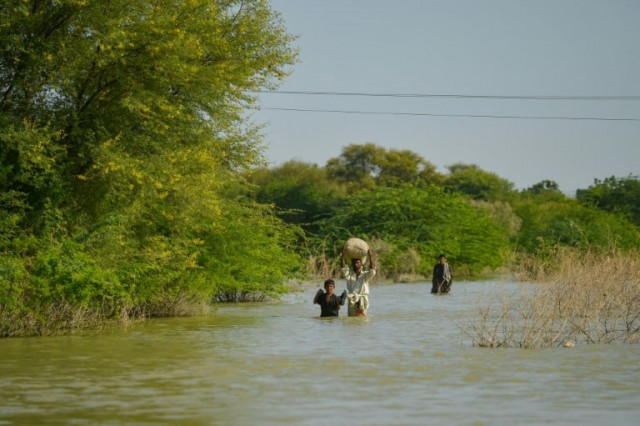Climate change or bad governance: A case of unprecedented flooding in Pakistan
Multiple paths to foreign aid have opened up with over $500 million being pledged by international organizations

The monsoon season of 2022 was one marked with disaster for Pakistan. In August alone, Pakistan witnessed over 166mm of rain as opposed to the usual average of 48mm as reported by the National Disaster Management Authority in the country. This unprecedented amount of rainfall has wreaked havoc in four major provinces of Pakistan including, Sindh, Balochistan, Khyber Pakhtunkhwa, and Punjab, leaving over 30 million people displaced and shelter-less. Such an impact on the lives of the people calls into question the response of the local and federal authorities as well as what measures were taken to prevent the extent of this calamity in the first place.
There is no denying the fact that such abnormal changes in weather patterns are caused by the looming phenomenon that is climate change. Climate change is no longer a threat that is approaching us, but in fact, one that has already begun knocking on our doors. However, although Pakistan has only contributed to about 0.4% of global carbon emissions (the main culprit of climate change) since 1959 (Amnesty International: August 2022), it is one of the many developing nations that are facing the brunt of the situation in full force. The devastating flooding situation in the country in August this year is just one effect of climate change that we have been forced to encounter.
Multiple paths to foreign aid have opened up in the last few months with over $500 million being pledged by international organizations as well as countries from the Global North such as the United States of America and Canada. The UN too came forward to raise awareness about the calamity in Pakistan in the wake of climate change and encouraged countries to aid Pakistan in responding accordingly. In addition to this, local non-governmental organizations such as Al-Khidmat have been in the front line in order to assist the displaced Pakistanis across the country and to provide them with emergency aid.
However, these floods are not a one-time occurrence in Pakistan. In fact, according to the Federal Flood Commission, Pakistan has witnessed approximately 28 floods since its independence in 1947. Despite these recurring floods, there exists a serious lack of infrastructure and a stringent policymaking process to support the response to these floods and reduce the damages incurred by the people of Pakistan as well as the economy. In 2022 alone, we have yet to receive transparent reports on what steps are being taken by the government to respond to the affected Pakistanis and what development plans are underway to prevent such destruction in the future.
According to the Government of Sindh, Rs. 459bn had been approved for the Annual Development Programme in Sindh alone for the fiscal year 2022-2023. Rs. 22.65bn of this Annual Development Programme expenditure has been set aside for the “Sindh Reliance Project” in order to manage the risk of floods and droughts in the region. However, simultaneously, the Chief Minister of Sindh has called on international organizations to provide monetary aid to Pakistan in order to mitigate the devastating after-effects of the 2022 floods. This alone calls into question the need for transparency in policymaking and development plans of the provincial and federal governments to allow the public to witness the results of what has been promised.
The clock is currently ticking for Pakistani government officials. Provincial authorities as well as federal authorities must rise to the responsibility that has been instilled within them to work for the benefit of the lives of the Pakistanis. It is required that not only must they respond and rehabilitate the displaced people of Pakistan effectively but to also introduce policies that take into account the destruction that climate change can cause. Climate change is an enemy that has only been growing stronger with time and policies that not only aim to reduce its impact but also to reduce the factors that aid climate change are the need of the hour.



















COMMENTS
Comments are moderated and generally will be posted if they are on-topic and not abusive.
For more information, please see our Comments FAQ